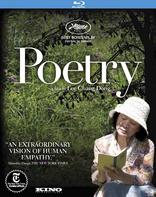Poetry Blu-ray Movie
HomePoetry Blu-ray Movie 
시 / ShiKino Lorber | 2010 | 140 min | Not rated | Aug 23, 2011
Movie rating
8.1 | / 10 |
Blu-ray rating
| Users | 4.5 | |
| Reviewer | 4.5 | |
| Overall | 4.5 |
Overview
Poetry (2010)
A sixty-something woman, faced with the discovery of a heinous family crime and in the early stages of Alzheimer's disease, finds strength and purpose when she enrolls in a poetry class.
Starring: Yun Jeong-hie, Lee Da-wit, Kim Hee-ra, Ahn Nae-sang, Myeong-shin ParkDirector: Lee Chang-dong
| Foreign | Uncertain |
| Drama | Uncertain |
Specifications
Video
Video codec: MPEG-4 AVC
Video resolution: 1080p
Aspect ratio: 1.85:1
Original aspect ratio: 1.85:1
Audio
Korean: DTS-HD Master Audio 5.1 (48kHz, 24-bit)
Subtitles
English
Discs
50GB Blu-ray Disc
Single disc (1 BD)
Playback
Region free
Review
Rating summary
| Movie | 4.5 | |
| Video | 4.5 | |
| Audio | 5.0 | |
| Extras | 2.0 | |
| Overall | 4.5 |
Poetry Blu-ray Movie Review
Inspired free-verse filmmaking.
Reviewed by Casey Broadwater August 16, 2011Lauded writer/director Lee Chang-dong has emerged in the last ten years as one of South Korea’s greatest filmmakers, and on August 23rd, U.S. viewers will have a chance to pick up his two most recent movies on home video, 2007’s Secret Sunshine—by way of the Criterion Collection—and last year’s Poetry, which comes to us via Kino International. Both films are beautiful, restrained, and emotionally powerful in a way that washes over you almost unexpectedly. Korean cinema in general has a tendency to veer into the melodramatic and overly sentimental, but Lee Chang-dong somehow manages to escape this particular pitfall, even when dealing with subject matter that would seem to be primed for undeservedly baroque emotion. This is especially true in Poetry, a film about an elderly woman who deals with the onset of dementia and her grief over the death of a local schoolgirl by looking for poetic inspiration in the world around her. This kind of story could be disastrously maudlin in the wrong hands, but Lee’s approach is a rather strict realism that leaves little room for excessive floweriness. The film is gentle, but not cushiony; alive with feeling, but never falsely so. You might say it lives up to its name.

The film opens with a languid shot of an equally languid river—giving us a taste of the sort of measured pacing we can expect for the next two and a half hours—as it flows past a group of kids playing on its banks. Something is floating in the water; when it gets closer, we realize it’s a dead girl in a school uniform, floating face down, her black hair waving. Cicadas hum, birds chirp in the distance, and Lee’s camera observes the body dispassionately, as if it were just another element of the natural world. We fade out and reemerge on sixty-six year old Mija (Yoon Jeong-hee), a prim, pleasant, slightly eccentrically dressed pensioner, as she visits her doctor about a tingling sensation she’s been having in her arm. She tries to describe how it pulses through her, but she can’t recall the word “electricity,” and she admits that lately her vocabulary has been slipping. Her doctor wants her to go see a specialist in Seoul for some tests.
Outside the hospital, Mija sees the mother of the drowned girl suffering an emotional breakdown, but she doesn’t yet know that she shares a connection with the devastated mom, a poor and widowed farmer. That connection is Mija’s grandson, Wook (Lee David), a dour, pimply-faced teen she’s been raising since his mother abandoned him after a divorce. One afternoon, Mija is summoned to a meeting with five of Wook’s friends’ fathers, who explain the situation: their sons have admitted to repeatedly raping the schoolgirl, whose death has since been ruled a suicide. To protect their sons’ futures, they agree to collectively pay the girl’s mother 30 million won in the hopes that she won’t instigate an investigation or leak the real story to the press. Mija, who survives on social security and the petty cash she makes doing odd jobs as a maid, is forced to go along with the plan, but has no idea where she’ll get her share of the money. She seems to put that worry on the backburner, focusing instead on the poetry class for adults she’s recently joined, hoping to sharpen her word retrieval and find the inspiration to write a single poem before the course is through.
The film’s narrative is built from repetitions of Mija’s daily routines, and this gives Poetry a lulling, hypnotic quality, showing us how Mija’s life is subtly but increasingly altered by her grief over the dead young victim and the poetic lens through which she now tries to view the world. She pauses, notebook and pencil in hand, to observe the wind in the trees, to consider the fate of a fallen apricot or attempt to describe the exact blood- red hue of a camellia. We see her fixing several meals for her ungrateful grandson—reminding him that “food going into Wook’s mouth” is what she likes to see more than anything—and they play badminton together, him dutifully and resentfully, her with spry energy, eager to get some exercise. They never talk outright about the rapes, or about much of anything else, for that matter—the multi-generational gap seems too wide for either of them to cross—but Mija’s love of Wook and her pain and disappointment in not being able to understand his actions are both achingly clear. Just as compelling is her awkward, alternately subservient and controlling relationship with Mr. Kang (Kim Hira), an embittered stroke victim who pays her a pittance to clean his house and bathe him every few days. Late in the film, Mija does something for Mr. Kang that could either be interpreted as an act of compassion or an intentional ploy to get some money from him, and it’s largely left to the viewer to decide. Either way, it’s a difficult, thought- provoking scene that’s handled with exacting delicacy and ambiguity.
That last sentence could be aptly used to describe the entire film. Poetry bares some passing resemblances to 2009’s Mother, by fellow Korean Bong Joon-ho—both feature an elderly female protagonist, mental disability, and the murder of a local schoolgirl—but unlike Bong, director Lee Chang-dong isn’t at all interested in the potential mystery/thriller aspects of the story. Mother is a clever and devastating whodunit, but Poetry is a totally different kind of film, a pure drama that moves in slow, cyclical rhythms much closer to those of real life. While there’s a certain satirical blade pointed at masculine dominance and immorality in South Korean culture—the boy-rapists seem unremorseful, their fathers eager to hush up the crime, bribing cops and teachers and the press—this is never preachy, and it’s certainly tangential to the quiet, deeply human arc that Mija makes as a character, from meek old lady to a true poet who can see and appreciate beauty even in darkness and suffering. Lee’s restrained style and sad, humanist storytelling make Poetry feel like the kind of movie Yasujiro Ozu would be making if he were still alive—that’s a high compliment—but the director’s greatest debt is to actress Yoon Jeong-hee, who came out of a sixteen-year retirement to deliver a heartbreaking performance that is the film’s very soul.
Poetry Blu-ray Movie, Video Quality 
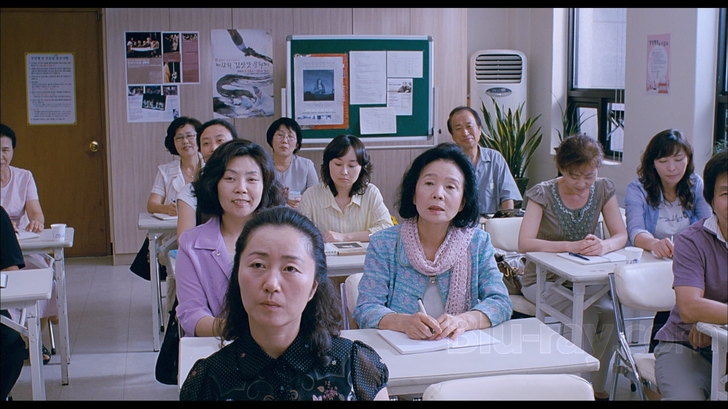
I was going to make some sort of joke about Poetry in motion, but let's dispense with the bad puns and get right down to business: the 1080p/AVC-encoded transfer included here is a wonderful representation of the film's realistic aesthetic, and I doubt we could ask for much better. The image is fine-grained and, with the exception of certain darker scenes, nearly noiseless. This leaves an image that's crisp and well-defined, with a strong display of skin texture, clothing detail, and all-around clarity. Edge enhancement is never a concern, and although there are scenes where traces of light noise reduction seem to be visible, the emphasis is on "light." (No smeary, waxy, detail-erasing sludge here.) As you can tell from the screenshots, the color scheme is decidedly natural, with no stylization whatsoever, and the various hues have a good density, looking neither oversaturated nor washed out. Black levels are similarly deep, and the image has an excellent sense of contrast and depth. There were a few instances when I noticed some moiré-like shimmer on certain extremely fine textures—like some of Mija's blouses—but I spotted no overt compression problems or potential encode issues.
Poetry Blu-ray Movie, Audio Quality 
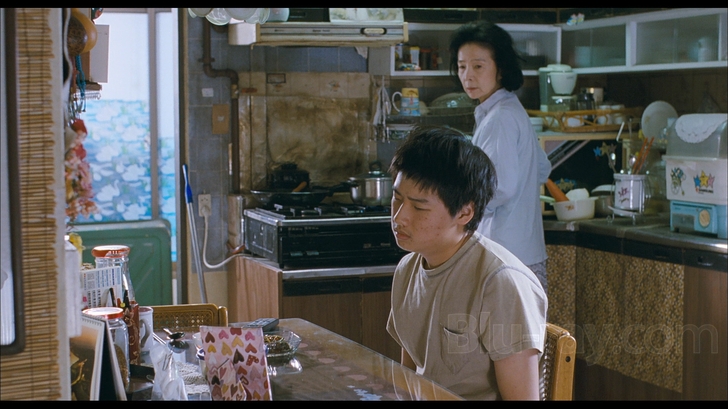
You don't necessarily think of quiet dramas as having particularly immersive sound design, but Poetry's lossless DTS-HD Master Audio 5.1 surround track is a finely tuned expectation breaker. The film may not have booming LFE explosions or whiz-bang cross-channel effects, and it certainly doesn't have a booming, all-encompassing score—there is no score, whatsoever—but it's very clear from the first frames that much attention was paid to creating a realistic, engaging-but-unobtrusive sound space. As the film opens, the river gurgles and laps, cicadas buzz all around, chirps erupt from definable locations, and a single tweeting bird flies from left to right through the soundfield in a seamless pan. It almost sounds like you're listening to a binaural recording—you feel like you're floating along right in the middle of the river. This sense of spot-on ambience continues for just about the entire film. Every location comes alive with believable environmental noise, from light traffic sounds and convincing applause that surrounds you from all directions, to sprinkling rainfall, clamor in an arcade, and believable acoustics inside and around the church where the drowned girl's wake is taking place. There's not much need for larger-than-life bass—this isn't the kind of film where the subwoofer is activated anytime anything dramatic happens—but the dynamic range is solid, and everything sounds rich and clear. The lack of a score means that the film has to earn its emotions on its own, and it does. Dialogue throughout is clean and comprehensible, and I didn't hear any muffling, crackles, etc. Optional English subtitles are presented in easy-to-read white lettering.
Poetry Blu-ray Movie, Special Features and Extras 
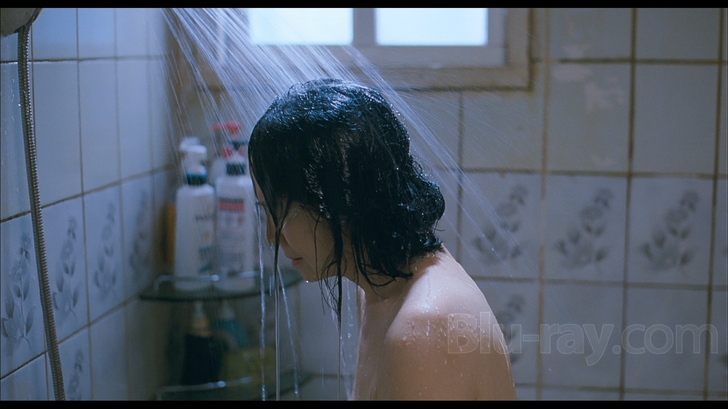
- Making of Documentary (1080i, 8:32): Actress Yoon Jeong-hee and director Lee Chang-dong discuss the making of the film and provide insight into their working processes.
- Actor Interview (1080i, 2:28): A short interview with Ahn Nae-sang, who plays one of the fathers.
- Trailers: Includes trailers for Poetry (1080p, 1:53), Mademoiselle Chambon (1080p, 1:50), Love Comes Lately (1080i, 2:33), Lady Chatterley (1080i, 2:10), and Untold Scandal (1080i, 2:04).
- Stills Gallery (1080p): A user-directed gallery with 32 stills.
Poetry Blu-ray Movie, Overall Score and Recommendation 
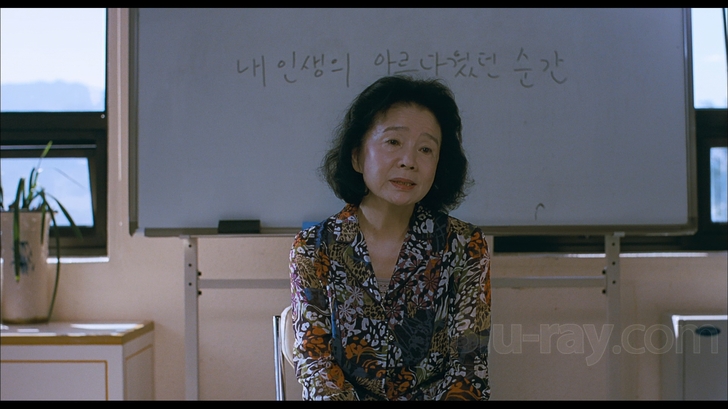
If you're a fan of South Korean cinema—or great dramas in general—you'll definitely want to pick up Secret Sunshine and Poetry on the 23rd. They're both beautiful, quietly devastating portraits, and they mark writer/director Lee Chang-dong as a major international filmmaking talent. The films look and sound wonderful on Blu-ray, and they belong together on your shelf. (If your OCD shelving methods can allow Criterion and Kino titles to intermingle.) Both come highly recommended!
Similar titles
Similar titles you might also like

Oasis
오아시스 | 4K Restoration
2002

Peppermint Candy
박하사탕 | 4K Restoration
1999

Green Fish
초록 물고기 | 4K Restoration
1997

Secret Sunshine
밀양 / Milyang
2007

Loveless
Нелюбовь / Nelyubov
2017

A Fantastic Woman
Una mujer fantástica
2017

Sarah's Key
Elle s'appelait Sarah
2010

Knife + Heart
Un couteau dans le cœur
2018

The Salesman
Forushande
2016

Pioneer
Pionér
2013

In the Fade
Aus dem Nichts
2017

The Color of Lies
Au coeur du mensonge
1999

When a Woman Ascends the Stairs
女が階段を上る時 / Onna ga kaidan wo agaru toki
1960

Ju Dou
1990

Drive My Car
ドライブ・マイ・カー / Doraibu mai kâ
2021

Young & Beautiful
Jeune et jolie / Slipcover in Original Pressing
2013

Tabu
2012

Misunderstood
Incompreso
1966

Maborosi
幻の光 / Maboroshi no hikari
1995

La Chienne
The Bitch
1931
